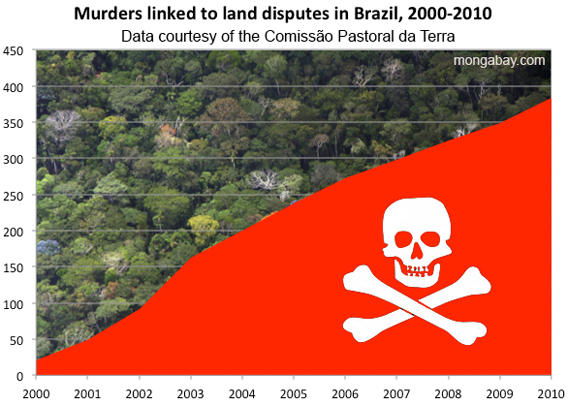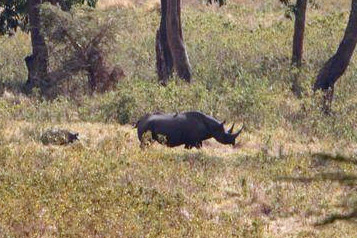November 2011 was a big month for environmental news stories.
Topping the list was the Obama Administration’s decision to delay the controversial Keystone pipeline which would have carried tar sands oil from Canada to the Gulf Coast. The scheme was vehemently opposed by environmental groups which turned the issue into a litmus test for Obama, whose campaign platform included a promise to take action on greenhouse gas emissions. Oil derived from tar sands has a heavy carbon footprint. More than 1,200 protesters were arrested in demonstrations leading up to Obama’s decision.
 Keystone protestors included kids. Photo by Amy Dewan. |
International climate talks opened in Durban, South Africa. Expectations for the meeting are low, with disputes between China, the United States, Canada, and India blocking any hope of progress in devising an immediate framework to reduce greenhouse gas emissions. Some analysts say that REDD, a plan to reduce greenhouse gas emissions from deforestation and forest degradation, is one of the few areas where talks could advance.
Ahead of the UNFCCC meeting, there were a spate of climate-related reports, including a dire warning from the International Energy Agency (IEA) that without bold action in the next five years the world will lock itself into high-emissions energy sources that will push climate change beyond the 2 degrees Celsius considered relatively ‘safe’ by many scientists and officials. The Intergovernmental Panel on Climate Change (IPCC) issued a report linking more extreme weather to climate change, while the Department of Energy announced that greenhouse gas emissions jumped six percent in 2009 to a new record.
Going bananas
In a surprise move, Dole abandoned a banana plantation in Somawathiya National Park in Sri Lanka after local organizations showed that it had been illegally established. Dole faced a lawsuit over the project.
Environmentalists dropped a bombshell when they accused Irwandi Yusuf, the governor of Aceh province, of breaking Indonesia’s deforestation moratorium by granting a palm oil concession in the Tripa peat swamp. Irwandi is globally renowned for his efforts to slow deforestation in Aceh, a forested province on the island of Sumatra. Green groups are seeking jail time for the governor, who has yet to respond to the charges. Irwandi supporters urged restraint until all the facts in the case come to light.
Another opponent of illegal logging was gunned down in Brazil. Nísio Gomes, a shaman in the Guarani tribe, was executed by masked gunmen in front of his community in the southwestern Brazilian state of Mato Grosso do Sul. Officials believe the gunmen were likely hired by local ranchers, who are embroiled in a land dispute with the Guarani tribe. In addition to killing Gomes, the gunmen allegedly kidnapped three young Guarani.

Murders tied to land disputes in rural Brazil, cumulative total of 383 since 2000.
Brazil’s Senate delayed its vote on a controversial revision to the country’s Forest Code, which restricts how much forest a landowner is allowed to clear on private property. Environmentalists fear the proposed changes could grant amnesty for past illegal deforestation while reducing protection for standing forests.
A Brazilian dam-builder quit a hydroelectric project in Peru after indigenous protests. In a letter addressed to the Peruvian Ministry of Energy and Mines, Odebrecht said it was withdrawing from the 1278-megawatt Tambo-40 Dam on the Tambo River in the Peruvian Amazon. The company said it would “respect the opinion of local populations” in pulling out of the project, which would have affected some 14,000 indigenous people along the Tambo and Ene Rivers. Meanwhile indigenous groups in Brazil were dealt a major set back when a federal court ruled that indigenous communities do not have the right to free, prior and informed consultation on the Belo Monte dam because its infrastructure and reservoirs would not be physically located on tribal lands. Tribal groups and environmentalists blasted the decision.
The U.N. Food and Agriculture Organization (FAO) released an update of its forest cover assessment based on satellite data. The research revealed that annual deforestation increased 56 percent from 2000-2005 relative to the 1990s. The previous assessment, based on self-reported forest inventories, suggested a decline in deforestation between the two periods.
The U.S. State Department announced it has pledged more than $450 million toward ‘green growth’ in Indonesia.
Spinning
Asia Pulp & Paper (APP) was caught in a scandal of its own making when its attempt to counter a Greenpeace campaign backfired. The paper giant had asserted that a letter from Integrated Paper Service (IPS) disproved Greenpeace’s allegations that rainforest fiber has been found in APP products, including toilet paper in New Zealand and toy packaging in the United States, but when pressed, failed to produce the letter or provide evidence to support its claims its paper is free of mixed tropical hardwoods, which in the case of APP are derived from natural forests. Elements of APP’s subsequent response were refuted by both Greenpeace and an independent testing lab in Germany. Separately, a report from Greenomics-Indonesia, a Jakarta-based environmental group, questioned the credibility of conservation initiatives APP says represent its commitment to sustainability.
New hope
A previously unknown species of omnivorous mammal was discovered in Cuc Phuong National Park, Vietnam. A part of the weasel family, the new species is known as a ferret-badger, a strange subfamily of mammals that have been little-studied by researchers. Smaller than proper badgers, ferret-badgers have elongated faces and long bushy tails.
A last goodbye: the western black rhinoceros roams the woodlands of Africa no more
 Black rhino and calf in Tanzania’s Ngorongoro Crater |
IUCN officially announced the extinction of the western black rhinoceros (Diceros bicornis longipes), one of four sub-species of black rhino. The rhino becomes the second declared extinct this year. All rhinos are threatened by the rhino horn trade.
Separately, a paper in Conservation Biology, reported that 99.5 percent of 583 conservation scientists surveyed believe we are in the midst of a mass extinction event.
Finally, a study published in PLoS One, warned that orangutans in Indonesia Borneo are being killed at a rate that far exceeds their ability to reproduce, raising the possibility of extinction outside protected areas. Much of the killing is the result of hunting in remote forests and conflict in areas that have been fragmented and converted for timber, wood-pulp, and palm oil production.
Most popular mongabay.com news articles – November 2011
- Photos: bizarre new mammal discovered in Vietnam [21,462]
- Tracking the coelacanth: Two decades of research confirms a viable population in Comoros [9,464]
- A final farewell: the Western Black Rhino goes extinct [7,437]
- Dole abandons banana plantation in National Park [6,855]
- World deforestation rates and forest cover statistics, 2000-2005 [6,844]
- Breakthrough technology enables 3D mapping of rainforests, tree by tree [5,570]
- Future threats to the Amazon rainforest [5,100]
- Unsung heroes: the life of a wildlife ranger in the Congo [4,180]
- Giant one-celled organisms discovered over six miles below the ocean’s surface [3,676]
- 11 challenges facing 7 billion super-consumers [3,210]
- Unanimous agreement among scientists: Earth to suffer major loss in species [3,094]
- Orangutans in Indonesian Borneo doomed to extinction? [2,705]
- War of words between Greenpeace, Asia Pulp & Paper over deforestation allegations [2,394]
- How to save the Amazon rainforest [2,323]
- Civilization shifting: a new leaderless era [2,218]
- Antarctic king crabs warming up to invade continental shelf, threatening unique marine community [2,084]
- Visiting the rainforest – a practical guide [2,025]
- Monarch butterflies decline at wintering grounds in Mexico, Texas drought adds to stress to migration [1,870]
- Small mammals use Borneo pitcher plant as toilet in exchange for nectar [1,864]
- Researchers challenge idea that marine reserves promote coral recovery [1,628]
- Indigenous community forcibly evicted for palm oil in Indonesian Borneo [1,623]
- Museum specimens reveal the tracks of an amphibian epidemic [1,620]
- First global assessment finds highest-grossing tunas and billfishes most vulnerable to extinction [1,579]
- Aloha, and welcome to the planet’s extinction capital [1,549]
- Indigenous technicians scour Amazonia to help researchers track wildlife populations [1,517]
- Last year’s greenhouse gas emissions topple worst-case scenario [1,488]
- Shamans and indigenous spiritual leaders unite in Malibu [1,487]
- Discovery Channel cuts climate change episode from Planet Earth follow-up [1,476]
- 12,000 surround White House to protest tar sands pipeline [1,451]
- IEA warns: five years to slash emissions or face dangerous climate change [1,420]
- ‘Cute’ umbrella video of slow loris threatens primate [1,414]
- Dubai’s artificial islands have high environmental cost [1,382]
- Bathtub-sized marine sponge rediscovered after a century of extinction [1,342]
- African cattle benefit from socializing with wild grazers during the wet season [1,335]
- Photos: five wild cat species documented in Sumatran forest imperiled by logging [1,334]
- Photos: 40% of Madagascar’s reptiles at risk of extinction [1,325]
- First ever survey shows Sumatran tiger hanging on as forests continue to vanish [1,319]
- Arctic sea ice melt ‘unprecedented’ in past 1,450 years [1,317]
- Amazon rainforest named as one of seven nature wonders [1,292]
- Malaysia must take action to avoid extinction of its last rhinos [1,230]
- Zoopharmacognosy: how self-healing animals could save humans [1,184]
- Why is oil palm replacing tropical rainforests [1,176]
- Entertainment media skews public perception of chimpanzees in the wild [1,172]
- Indigenous do not have right to free, prior and informed consultation on Amazon dam, rules Brazilian court [1,152]
- Laser-based forest mapping as accurate for carbon as on-the-ground plot sampling [1,117]
- Seahorses under stress [1,096]
- One night only: new orchid species surprises scientists [1,091]
- Covert Creatures: The Clandestine Lives of Seahorses [1,081]
- Cooper-Blackburn bill seeks exemptions for illegal wood imports [1,077]
- Coral reefs decimated by 2050, Great Barrier Reef’s coral 95% dead [1,070]
Italicized titles represent news articles posted during the month
Correction: The original version of this article stated “Greenpeace said it would take action against APP’s public relations firm, which it accused of ‘spinning’ the IPS letter.” Greenpeace subsequently clarified it will not filed a formal complaint.
Related articles














